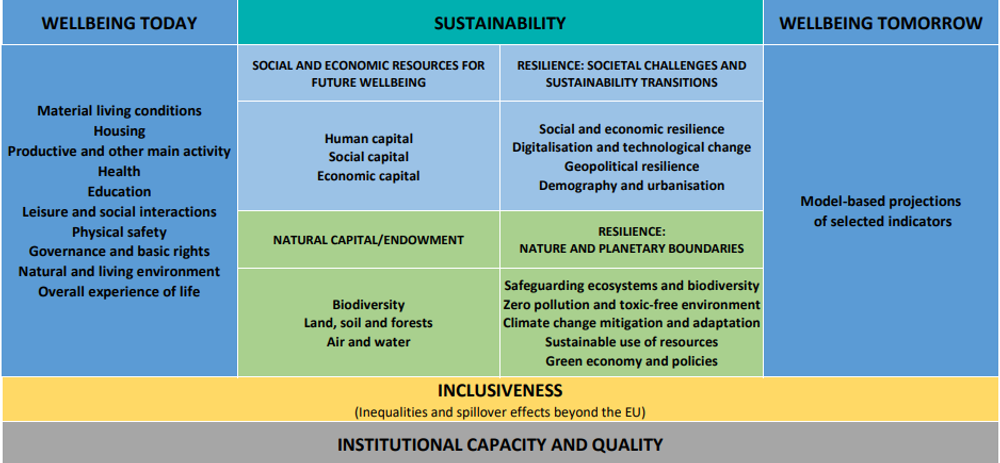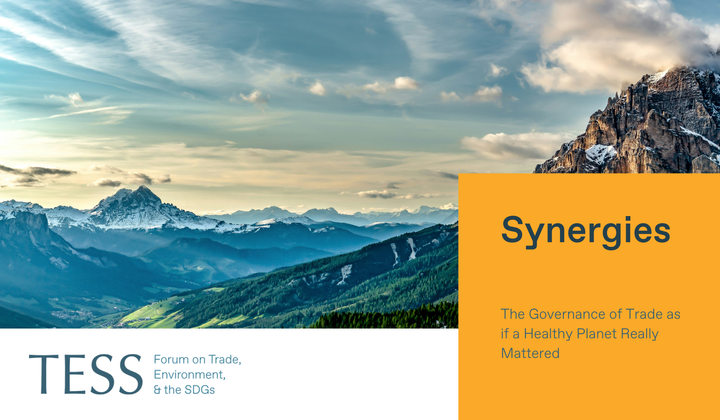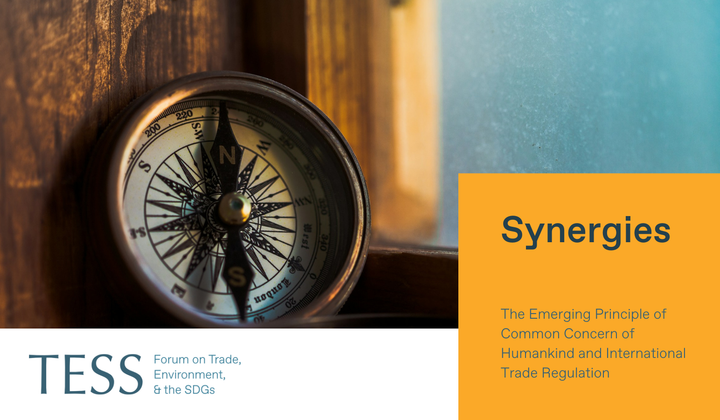In light of the shortcomings of the current model of economic growth, the beyond growth agenda is no longer a fringe topic within economic circles as governments and stakeholders progressively realize the need to think beyond GDP growth as the sole or even primary purpose of economic policy.
The “beyond growth” agenda is seldom discussed within the global trade system.* The trade community at large still assumes that growth in economic activity, as measured by GDP, is the ultimate pursuit of economic policy and that growth in global trade is one of the best levers to accelerate economic growth. For the past four decades, the support to GDP growth has been the key argument for espousing trade liberalization. Similarly, indicators on trade included in the monitoring framework for the Sustainable Development Goals (SDG 17 on Partnerships for the Goals) include global average tariff levels (Indicator 17.10.1), revealing the assumption that lower tariffs and sustainable development are closely correlated.
Yet, the model of green and inclusive growth, promoted since the 1990s, is failing to deliver sufficient improvements in well-being, and its material intensity is threatening that of present and future generations.
The model of green and inclusive growth is failing to deliver sufficient improvements in well-being, and its material intensity is threatening that of present and future generations.
Indeed, the global economy has proven unable to decouple GDP growth from material use. According to the International Resources Panel Global Resources Outlook 2024, if current patterns of global production and consumption do not shift, global material use is in fact expected to grow by an average of more than 2.3% per year—i.e. at a greater rate than increases in well-being (as measured by inequality-adjusted Human Development Index). Growing material use is the single biggest driver behind the climate, pollution, and biodiversity crises, whose compounded impacts are threatening countless lives and livelihoods, especially in low- and middle-income countries.
The Beyond Growth Agenda
In light of these shortcomings, the beyond growth agenda is no longer a fringe topic within economic circles as governments and stakeholders progressively realize the need to think beyond GDP growth as the sole or even primary purpose of economic policy.
At the international level, the latest draft declaration (the Pact for the Future) of the UN Summit of the Future, which is scheduled to take place this coming September, requests for the Secretary-General “to establish an independent high-level expert group to develop recommendations for a limited number of [ … ] indicators of sustainable development that complement and go beyond GDP” and “to present the outcome of its work during the eightieth session of the General Assembly” and establish an intergovernmental process to consider these recommendations. The OECD, hardly a heterodox organization in terms of economic theory, has a long established beyond growth agenda, which foresees four key objectives for economic policymaking: environmental sustainability, rising well-being, falling inequality, and system resilience, which might or not be achieved through GDP growth.
Discussions are currently underway to explore new frameworks and indicators to measure sustainable prosperity and sustainable development in ways that complement the use of GDP.
With an even more radical discourse, pronounced at the Beyond Growth 2023 Conference, the President of the European Commission, Ursula von der Leyen, stated the following: “It was Robert Kennedy back in the 1960s who famously said that GDP ‘measures everything, except that which makes life worthwhile: the health of our children, or the joy of their play’. […] Today, on a very fundamental level, we understand Kennedy’s wisdom. That economic growth is not an end in itself. That growth must not destroy its own foundations. That growth must serve people and future generations.”
Discussions are currently underway within the European Commission to explore new frameworks to measure sustainable prosperity in ways that complement the use of GDP (see figure). Countries and regions such as New Zealand, Iceland, and Scotland are also exploring how to move towards economic models aiming at well-being rather than growth.

Main components and dimensions of a sustainable and inclusive well-being framework (JRC, 2024).
The Role of International Trade in the Beyond Growth Agenda
In the beyond growth literature to date, there are few references regarding the role of international trade.
In the beyond growth literature to date, there are few references regarding the role of international trade. The beyond growth agenda considers the nature and quality of economic activity (rather than its volume), differentiating goods and services (whether domestically produced or internationally traded) whose impact is positive for inclusive and sustainable well-being from those that are not and measuring sustainable prosperity accordingly.
In 2023, an IMF study warned that higher economic fragmentation caused by growing restrictions to trade would lead to “a reduction in global output of 7 percent over the long term, or about $7.4 trillion in today’s dollars, which is the equivalent to the combined size of the French and German economies.” Under a beyond growth agenda, this purportedly negative impact would need to be further analysed in terms of its effects on inclusive and sustainable well-being. This impact could be negative or positive, depending on the type of goods, services, and supply chains affected.
Within a beyond growth agenda, the economic, environmental, and social footprints of all products and services would be considered in line with economy-wide environmental ceilings and social floors.
Within a beyond growth agenda, the economic, environmental, and social footprints of all products and services would be considered in line with economy-wide environmental ceilings and social floors. Because of their impact on the structure, expansion, and relative factor-intensity of economies, beyond growth policies—in line with sustainable and inclusive well-being—would be expected to have spillover effects on the global economy, disrupting the current geography of trade, which is based on terms of trade that do not internalize positive and/or negative environmental and social externalities related to the production, consumption, and trade of goods and services.
For some proponents of the beyond growth movement, this would contribute to “decolonize the economies of the Global South” by severing raw material dependencies, whereas others see beyond growth economics as a manifestation of yet another neo-colonial agenda imposed on developing countries, with negative impacts on their economic, environmental, and social prospects.
Moreover, to ensure the well-being of present and future generations, beyond growth economies would need to be markedly more resource-efficient to guarantee decent living conditions within planetary boundaries. Access to resource-efficient technologies would be paramount, suggesting that the technique effects of international trade could play a role in reaching the ultimate goals of the beyond growth agenda. This line of thinking is very much in accord with the WTO 2023 Annual Report, which warns that greater economic fragmentation could have adverse rather than beneficial impacts for the transition to environmental sustainability.
Supporting Greater Convergence in Well-Being
As part of the mandate of the high-level expert group tasked with developing recommendations for indicators that go beyond GDP (as proposed in the latest draft text of the Pact for the Future), it would be opportune to consider the positive and negative spillover effects of a beyond growth agenda across different types of economies with uneven levels of sustainable and inclusive well-being and the role that international trade could play in supporting greater convergence in well-being outcomes between countries.
In this context, it would also be important to formulate better trade-related indicators for the post-2030 framework than indicators such as the worldwide weighted tariff-average, which appears to be a completely outdated measurement of environmental and social sustainability, defined as inclusive and sustainable well-being.
-----
* In this piece we refer to the concept of “beyond growth”, which is growth agnostic and proposes instead to “change the composition and structure of economic activity to achieve the multiple goals of a more rounded vision of economic and social progress.” However, some of the references in this piece come from a different school of thought, that of degrowth, which sees growth as a problem in and of itself and foresees a socially sustainable and equitable reduction of society’s throughput.
----------
Céline Charveriat is the Founder of Pro(to)topia Consulting. Her latest publication is entitled New Metrics for Sustainable Prosperity: Options for GDP+3.
-----
Synergies by TESS is a blog dedicated to promoting inclusive policy dialogue at the intersection of trade, environment, and sustainable development, drawing on perspectives from a range of experts from around the globe. The editor is Fabrice Lehmann.
Disclaimer
Any views and opinions expressed on Synergies are those of the author(s) and do not necessarily reflect those of TESS or any of its partner organizations or funders.
License
All of the content on Synergies is licensed under a Creative Commons Attribution-NonCommercial-ShareAlike 4.0 International (CC BY-NC-SA 4.0)
license. This means you are welcome to adapt, copy, and share it on your
platforms with attribution to the source and author(s), but not for
commercial purposes. You must also share it under the same CC BY-NC-SA
4.0 license.
If you would like to reuse any material published here or if you have any other question related to Synergies, send an email.




